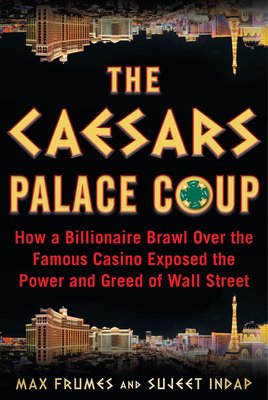
Book Review of The Caesars Palace Coup: How a Billionaire Brawl Over t…
Book Review: The Caesars Palace Coup by Indap and Frumes
When I first stumbled upon The Caesars Palace Coup: How a Billionaire Brawl Over the Legendary Casino Ended in Collapse, I was intrigued by the chaos behind one of the most iconic names in the gambling world. After all, who doesn’t want a front-row seat to the fireworks that ensue when ruthless financiers clash over immense wealth? Authors Jason Indap and James Frumes weave a tale that captures the essence of high-stakes finance with a dramatic flair that kept me glued to the page.
At its core, The Caesars Palace Coup dives deep into a conflict that showcases the darker underbelly of corporate America, aptly encapsulated by the term "creditor-on-creditor violence." If you’ve enjoyed the likes of The Predators’ Ball or Barbarians at the Gate, this book is a natural fit, offering not just entertainment but a rich education about the forces shaping modern finance. Through the lens of Caesars Entertainment’s tumultuous history, we witness a thrilling showdown—think of it as a reality TV battle among estranged billionaires, where no one is safe from ruthless tactics and sharp tongues.
One of the standout elements of the narrative is the compelling cast of characters. From the shrewd Howard Marks and the relentless David Tepper to the iron-fisted Leon Black of Apollo, each figure is fleshed out with depth and personality. I found myself echoing their sentiments—frustrated and amused alike—at the antics of David Sambur, whose cutthroat demeanor seemed to encapsulate everything chaotic about high finance. The authors sprinkle humor throughout, and I couldn’t help but chuckle at Sambur’s over-the-top quotes, like asking where his rival’s breakfast was so he could “dip his balls in it.” Moments like these punctuate the intense discussions and give readers insight into the climate of extreme competitiveness that defines the corporate finance world.
The writing style of Indap and Frumes is both accessible and captivating, making complex financial maneuvers digestible without sacrificing depth. The pacing ebbs and flows smoothly, balancing detailed explanations with gripping storytelling. However, I did find myself occasionally lost in the sea of characters and their intricate relationships. A few reminders or reintroductions would have helped maintain clarity, especially during the book’s more intricate passages.
One particularly striking quote from the book resonated with me, “It’s a lot of fun to go duck hunting, I guess until the ducks start shooting back.” It’s a brilliant metaphor for what Apollo faced in the midst of its financial maneuvers, underscoring the reality that the game of high finance can quickly turn perilous when stakes are at their highest.
I wholeheartedly recommend The Caesars Palace Coup to anyone with a vested interest in corporate finance or the machinations of private equity. While it may not resonate with those outside this realm, the authors have done a commendable job of painting a complex picture of a unique financial saga. Personally, I found the reading experience enlightening, prompting me to reflect on the tension between ambition and ethics in the world of high finance.
In a nutshell, if you’re curious about how big money and big egos collide, or if you simply enjoy tales filled with drama, deceit, and vivid characters, this book is sure to entertain and inform. Grab a copy, settle in, and prepare for a wild ride through the tangled streets of financial warfare.
Discover more about The Caesars Palace Coup: How a Billionaire Brawl Over t… on GoodReads >>






